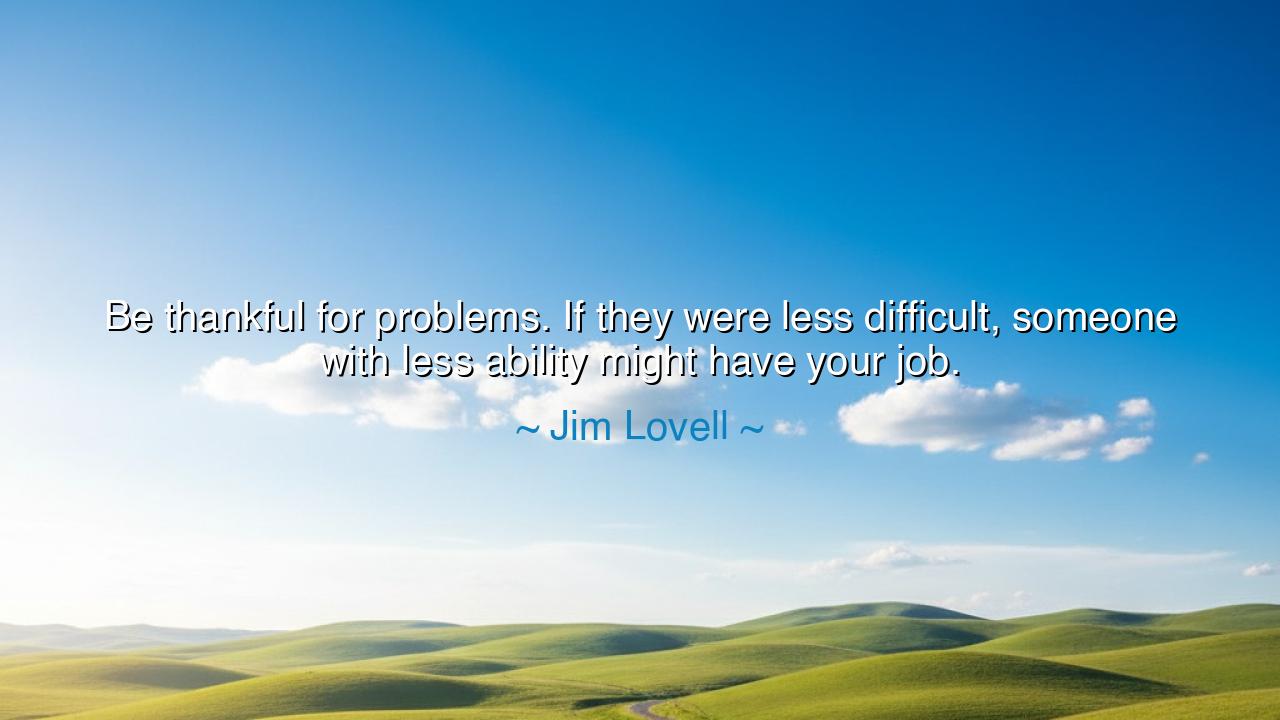
Be thankful for problems. If they were less difficult, someone
Be thankful for problems. If they were less difficult, someone with less ability might have your job.






Jim Lovell, commander of Apollo 13, spoke with the clarity of one who had faced peril in the black silence of space: “Be thankful for problems. If they were less difficult, someone with less ability might have your job.” These words are not merely practical advice, but a heroic call to see adversity not as curse but as honor. In Lovell’s mind, problems were the very proof of one’s worth; they were the refining fire that distinguished the capable from the careless, the prepared from the untested.
To be thankful for problems is to embrace struggle as the measure of greatness. Easy tasks require little strength and attract many hands. But the hard tasks, the impossible ones, are entrusted only to those with courage and skill. Lovell reminds us that our trials are not punishments, but confirmations—that we have been deemed capable of bearing heavy burdens. Where there is great difficulty, there is also great trust.
The Apollo 13 mission itself is the living proof of this wisdom. When an oxygen tank exploded and the spacecraft was left crippled, Lovell and his crew were thrust into a storm of problems that seemed unsolvable. Yet it was precisely in those impossible hours that their training, ingenuity, and resolve shone brightest. “Houston, we’ve had a problem,” became not a statement of doom, but the beginning of a triumph of human perseverance. The crew returned safely, and history remembered the mission not as a failure, but as “a successful failure”—because the problems were immense, but the ability to solve them was greater still.
So too in every age, the greatest men and women have risen not in ease, but in adversity. Winston Churchill, tasked with leading Britain through the fire of the Second World War, would never have been remembered had the times been calm. It was the crushing weight of the problem that called forth the greatness of his leadership. The harder the trial, the higher the crown. Thus, problems are the stage upon which greatness is revealed.
Rousseau once said that difficulties strengthen the mind as labor strengthens the body. Lovell’s words echo the same truth. If problems are smaller, lesser hands may carry them; if problems are mighty, it is only the mighty who may endure them. To complain of problems, then, is to despise the very evidence of your strength. To be grateful for them is to embrace the calling that sets you apart.
The lesson is clear: when faced with obstacles, do not shrink back, and do not curse your fate. Instead, say with Lovell: “I am thankful.” For these problems mark you as chosen, as capable, as entrusted. They are the evidence of your worth. The greater the challenge, the greater the opportunity to rise.
Practically, we may cultivate this mindset daily. When work grows heavy, remind yourself: this burden was not given to lesser shoulders. When obstacles come, see them as training, sharpening your strength for greater trials ahead. And when you overcome them, give thanks—not only for the victory, but for the honor of having faced the problem at all.
Thus, Lovell’s words become a battle-cry for all who labor under weighty trials: be thankful for problems. They are not chains but crowns, not curses but callings. For they prove that you are capable of greatness, and that life has entrusted you with what only the strong can bear.






AAdministratorAdministrator
Welcome, honored guests. Please leave a comment, we will respond soon